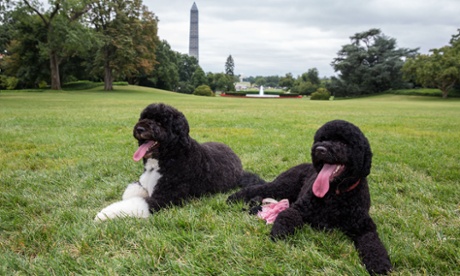Reconocer un rostro dentro de una multitud es, de momento, empresa casi imposible. Dejará de serlo si el proyecto BOSS sale adelante. Les dejo algo de la información de primera página del NYT. Así que, nos controlan por la declaración de la renta, los datos sanitarios están en línea, si usamos tarjetas de crédito, se sabe hasta el último euro que gastamos, la red es pasto de ciberespionaje, las llamadas telefónicas son GPS personales. En fin que no hay remedio: estamos desnudos e inermes ante el Gran Hermano tecnológico. Y eso sin contar con los chivatos humanos.
 |
| Los chuchos, tan feuchos, son las queridas mascotas de la familia Obama. No tienen nada que ver con el proyecto BOSS. O tal vez lleven chips incorporados por mor de la seguridad del Presidente. Nunca se sabe. Recuerdo un chiste mexicano en el que le preguntaban a un chico qué quería ser de mayor: "perro de gringo", dijo. Pues eso. |
"I would say we’re at least five years off, but it all depends on what kind of goals they have in mind” for such a system, said Anil Jain, a specialist in computer vision and biometrics engineering at Michigan State University who was not involved in the BOSS project.
The effort to build the BOSS system involved a two-year, $5.2 million federal contract given to Electronic Warfare Associates, a Washington-area military contractor with a branch office in Kentucky. The company has been working with the laboratory of Aly Farag, a University of Louisville computer vision specialist, and the contract was steered to the firm by an earmark request in a 2010 appropriations bill by Senator Mitch McConnell of Kentucky, the Republican leader.
Significant progress is already being made in automated face recognition using photographs taken under ideal conditions, like passport pictures and mug shots. The Federal Bureau of Investigation is spending $1 billion to roll out a Next Generation Identification system that will provide a national mug shot database to help local police departments verify identities.
But surveillance of crowds from a distance — in which lighting and shadows vary, and faces tend to be partly obscured or pointed in random directions — is still not reliable or fast enough. The BOSS research is intended to overcome those challenges by generating far more information for computers to analyze.

